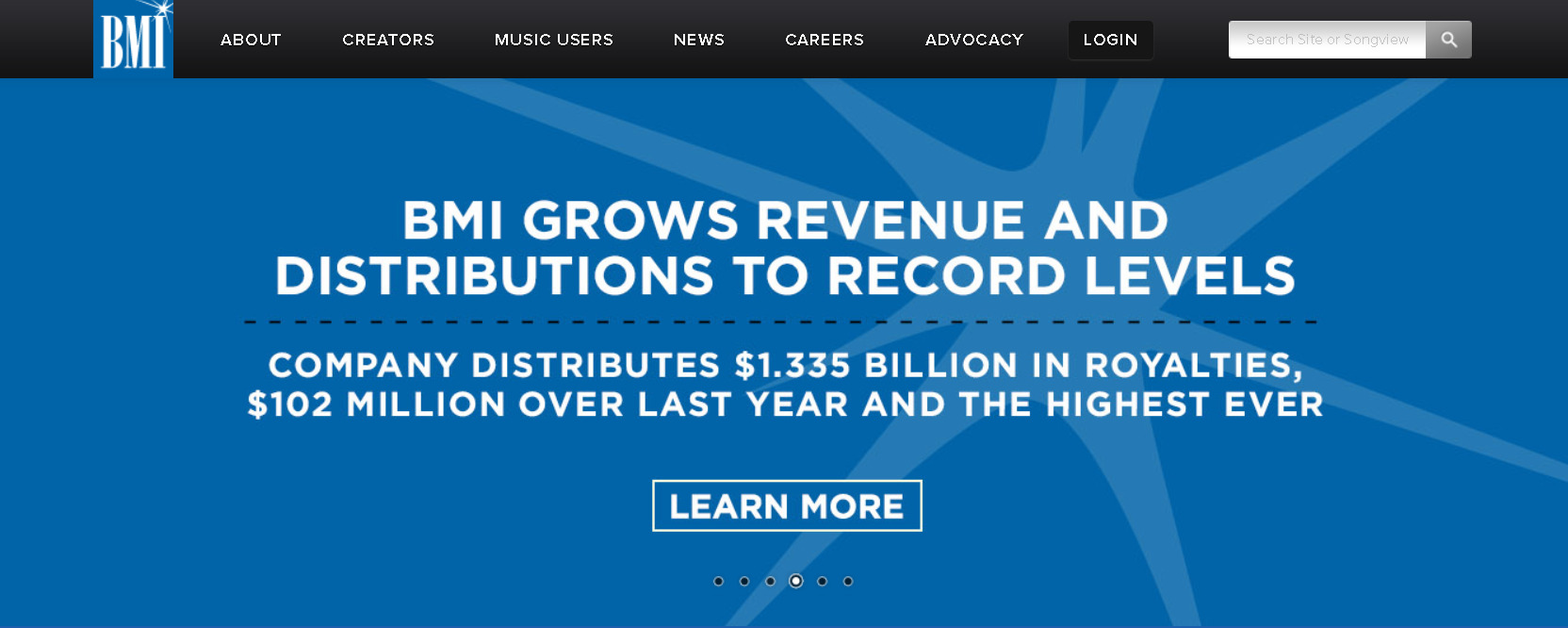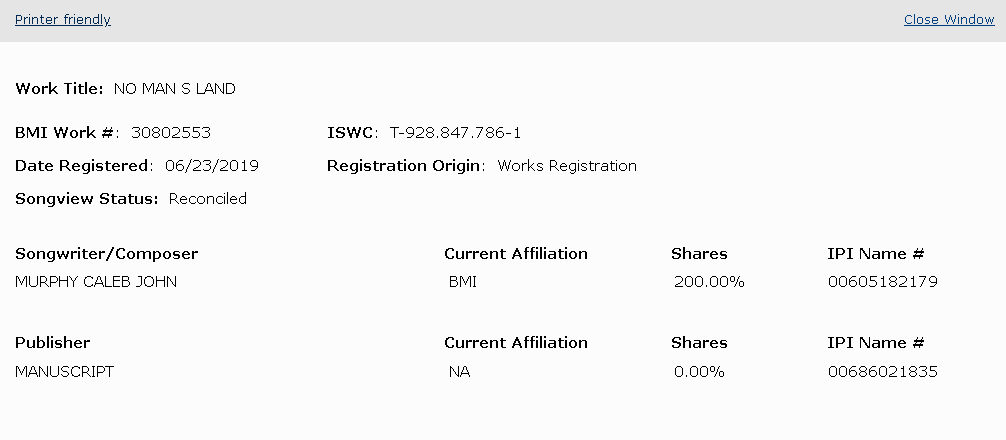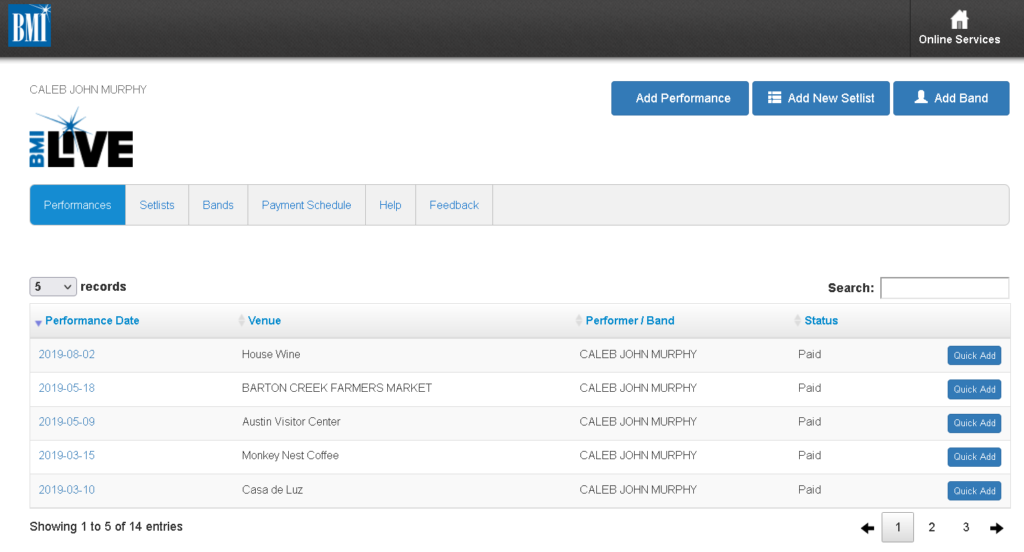

Caleb J. Murphy is a songwriter/producer based in Austin, Tx. His music has been on NBC, NPR, and licensed by hundreds of indie creators.
Share this:*( Update October 2023 – Since publishing this article, BMI has started to charge new songwriters a one-time affiliation fee of $75.)
If you’re a songwriter or publisher with BMI, or you’re thinking of joining BMI, this post is for you. They simply collect royalties for publishers and songwriters.
Broadcast Music, Inc. (BMI) is a performing rights organization (PRO).
It represents over 1.2 million songwriters and publishers, including Taylor Swift, Eminem, Willie Nelson, and so many other artists you know. And as of this writing, BMI represents over 18.7 million songs.
Other PROs in the United States include ASCAP, SESAC, and Global Music Rights (GMR), but you can only register your songs with one PRO.
So this post is all about BMI music royalties and how you can collect them as an indie songwriter.
BMI represents songwriters and publishers only.
The songwriter creates and owns the composition of a song.
The publisher acts on behalf of the songwriter, and they have the right to reproduce and distribute the recording (or any derivatives) of the song.
If you’re an indie artist, it’s very likely you’re both the songwriter and the publisher.
BMI collects performance royalties owed to songwriters and publishers. A “public performance” of a song you wrote is when:
So you earn royalties when any of the above happen. But in order for you to collect them, you have to be registered with a PRO like BMI.
For example, I recently got paid performance royalties for when my song was on NBC. But I would be missing out on that money if I didn’t register with a PRO (in my case, BMI).
BMI does not collect anything but performance royalties. They do not collect mechanical royalties or royalties for artists or record labels .
Just performance royalties.
To get your US mechanical royalties, either register with the MLC or an admin publishing company.
To collect your sound recording royalties from digital radio, you need to register with SoundExchange (in the US) for that.
Most countries have their own PROs, so if you’re not in the US, research what your local PRO is and sign up with them. Every PRO around the world has reciprocal agreements with each other.
BMI royalties are split 50/50 between the songwriter and publisher of a work.
BMI presents things a little differently than other PROs.
They operate from a total percentage of 200%. But it still splits down the middle ‒ 100% of the total to the songwriter and the other 100% to the publisher. I know, it’s weird. But that’s how they do it.
You’re not required to have a publishing company to collect the publishing side of your BMI royalties. So if you don’t have a publishing company, you’d enter 200% in the “Shares” field under “Songwriter/Composer.” However it’s always a good idea to register a “vanity publishing company” to make collecting your international performance royalties more seamless.

Yes, they keep about 12% of royalties collected and pay out the other approximately 88% to their songwriters and publishers.
Then once your royalties reach $250 for any given quarter, BMI sends you a direct deposit payout. Until your royalties equal or exceed that amount, they hold that money in your account .
The first step to collecting the royalties owed to you via BMI is to sign up here .
If you’re signing up as just a songwriter, there is a one-time affiliation fee of $75.
If you want to sign up under your publishing company, there’s a one-time $150 application fee if you own the company as an individual (it’s $250 if your publishing company is a partnership, corporation, or LLC).
Once you’ve set up your account, go to “Works Registration” under Applications on the sidebar. Hit “Add New Work” and start entering the information about your song.
After BMI approves your song registration, that song is eligible to earn performance royalties.
And in order to collect royalties for your live performances of your songs, go to “BMI Live” under Applications. You can add information about your performance, which of your songs you played, and how many times you played each. In my experience, I’ve gotten paid about $1-2 per performance per song (but this will obviously vary).

You are only able to sign up with one PRO as a songwriter. It is very difficult to switch, so you want to choose wisely.
Both BMI and ASCAP are not-for-profits. And it’s been said that BMI pays better for sync and ASCAP pays better for radio. There’s no published hard data on this, but after comparing royalty reports with co-writers (one with ASCAP and one with BMI), we can confirm this.
If you’re a songwriter in the US, you need to be registered with a PRO. Period. Whether that’s BMI, ASCAP or SESAC, that’s up to you. But pick one. And go get your money!
Caleb J. Murphy is a songwriter/producer based in Austin, Tx. His music has been on NBC, NPR, and licensed by hundreds of indie creators.